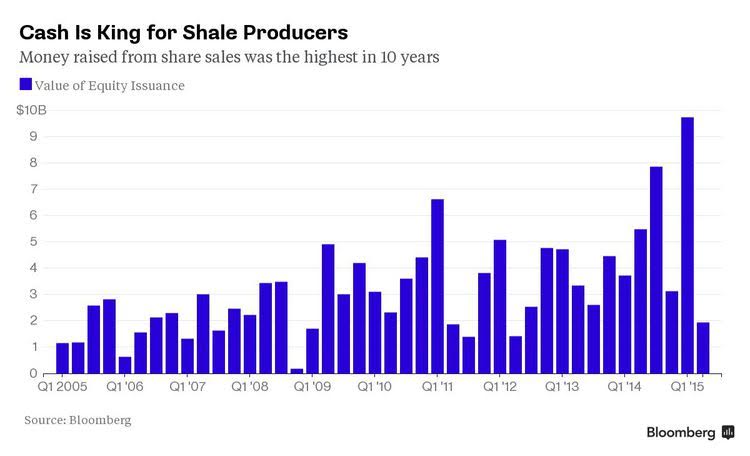Its my easy-like-Sunday morning reads:
• Barron’s Cover: Time to Buy Commodities (Barron’s)
• Distressed Sales 10 Percent of Homes Sold in U.S., Lowest Levels Since 2007 (WPJ)
• Nocera: When Jon Stewart Took Down CNBC’s Jim Cramer (NYT)
• Why Putting a Number to C.E.O. Pay Might Bring Change (NYT) see also 9 CEOs paid 800 times more than their workers (USA Today)
• Yes, Uber Lost a Lot of Money — And It Will Lose More (Re/code)
• The buzz(kill) about caffeine (Reveal)
• It’s clear the US should not have bombed Hiroshima and Nagasaki (Quartz)
• In first debate, Republicans ditch the lessons of 2012 (WaPo) see also Treatment of women a topic after GOP presidential debate (Seattle Times)
• We Remade Our Atlas to Reflect Shrinking Ice (Nat Geo)
• Will Lamborghini Fans Accept a SUV? (WSJ) see also Marines Say Costly F-35 Jet Fighter Is Finally Ready (WSJ)
What are you reading?
Cash Is King For Shale Producers

Source: Bloomberg


F-35 is CRV masquerading as a fighter plane. Initial operating capability (IOC) for the short take off vertical landing (STOVL) is conditional since the definition of IOC is a compromise. The most important mission that IOC performs is make a reason for sailing the ship that carries it. If an enemy poses a threat the F-35B can counter it won’t matter to the common defense, and would be cheaper addressed otherwise. Make up an IOC and declare victory! Why Trump can say who is and who is not a hero.
The A bomb is Pandora’s Box. It delivered the insane policy to fight small aggressive wars so that “they” don’t get so far into our empire to demand we nuke them. One worse event of WW II was the aircraft carrier navy which permits pointless sea raiders to look like strategies.
An interesting look at the current German economic model with workers (unions) and companies working together. I have thought for quite a while that the focus in the US on unions not being concerned about the survival of the companies while the companies look at negotiations as simply a way to keep short-term labor costs down is not a viable model for long-term economic success. There are a number of companies in the US that have bucked the trend of off-shoring manufacturing and usually a good working relationship between labor and management is at the core.
http://qz.com/452076/this-just-in-german-capitalism-has-won/
The Quartz article is pure retrospective speculation. Insofar as I am aware the Japanese Army was still determined to fight on even after Hiroshima and Nagasaki but the Japanese Emperor announced the surrender on radio:
http://www.theatlantic.com/international/archive/2015/08/emperor-hirohito-surrender-japan-hiroshima/400328/
Uneven recovery….
http://www.theatlantic.com/business/archive/2015/08/jobs-numbers-racial-gap-recovery/400685/
Saudi Arabia plays chicken…
http://www.theatlantic.com/business/archive/2015/08/low-oil-prices/400745/
https://www.nsa.gov/public_info/_files/cryptologic_quarterly/The_Uncertain_Summer_of_1945.pdf
The bomb, or at least the illusion that we had and could produce a sufficient number of fission weapons to obliterate the empire, was one of many individual factors that were driving Japan to surrender. NSA perspective is unique in that sigint played a huge role in the war on Japan.
Had we not had the a bomb, the straight napalm firestorms in wood and rice paper housing all over Japan with uncontested dominance of the skies over the home islands was certainly good enough; as was the constricting noose limiting commodities like oil, food, rubber, metals and so on that prevented resource poor Japan from producing war materiel without colonial imports.
My relatives who fought in the Pacific, and who never bought a Japanese car, would disagree with you.
The reality of global warming: We’re all frogs in a pot of slowly boiling water
http://blogs.reuters.com/great-debate/2015/08/07/before-the-century-ends-it-may-be-too-hot-for-people-to-work-outside/
An Innovative Way to Address Teacher Shortages: Higher Pay
Better yet, elevate teaching social status …a lot
Key & Peele – TeachingCenter
Boyd Maxwell and Perry Schmidt report on the latest developments in the exciting world of pro teaching.
Now that the WWII generation is dying out and generally incapable of defending their record, the revisionists are creeping out of the woodwork. Based upon what was known at the time, dropping the atomic bombs was the correct decision. And based on the words of Hirohito, resulted in the surrender of Japan. After various words basically taking the position that Japan initiated the war for good purposes, and it hasn’t gone so well despite all the hard work by Japan, Hirohito said, “…Moreover, the enemy has begun to employ a new and most cruel bomb, the power of which to do damage is, indeed, incalculable, taking the toll of many innocent lives. Should We continue to fight, not only would it result in an ultimate collapse and obliteration of the Japanese nation, but also it would lead to the total extinction of human civilization….”
So yes, the bombs should have been dropped, and yes, they did compel Japan to surrender.
I suspect the Soviet Union was part of the judgement to drop the bomb: It was already clear the partition of Europe and the dissection of Germany was going to become a serious problem going forward so an immediate, unconditional surrender of Japan to the US and the US alone became a priority.